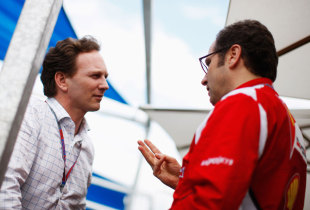- Red Bull news
Red Bull yet to sign letter over RRA

Christian Horner has explained the reasons behind Red Bull deciding not to sign off on the latest suggestions for the Resource Restriction Agreement (RRA), which including policing by the FIA.
It has emerged that ten of the Formula One teams have so far signed a letter to the FIA regarding the way the RRA is policed and other cost-cutting measures. Only Red Bull and Toro Rosso are yet to add their signatures, and Horner insists that Red Bull does want to reduce costs but feels the different structures within the teams means policing the personnel and working hours would be too difficult.
"What I would like to make clear is Red Bull is fully behind cost control in Formula One," Horner is quoted by Sporting Life. "Whether the RRA is the right route to achieve that is what we question. I believe that letter, from what I read, requested for the FIA to police the RRA, which in our opinion would be the wrong route.
"We believe whole-heartedly in controlling costs in Formula One and not frivolous spending. But there are better ways of doing that and containing that through the sporting and technical regulations as opposed to a resource restriction that relies on equivalence and apportionment of time and personnel. That is always tricky in subsidiary companies, particularly of automotive manufacturers. So we would be totally open to any discussion that involves cost control that pursued those avenues."
Horner dismissed the notion that Red Bull's reluctance to sign was because it had something to hide.
"It would suggest we're structured in a different way, as a single entity, as a race team. When FOTA (Formula One Teams' Association) was first created there were clear and tangible restrictions in personnel, amount of engines, gearboxes, in testing, all things you can see policed and genuinely save costs.
"They're the type of things that should be focused on rather than apportionment of people's time and equivalence which is, in any formula or mechanism, fraught with problems and difficulties. It was well intended at the time, but as with all these things, when you drill into the detail it's something much harder to police.
"That's especially the case when there are companies or teams which are subsidiaries of other organisations. For us, we would prefer to keep it simple and go on tangible, measurable items."

